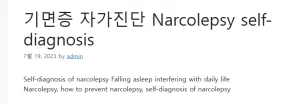Self-diagnosis of narcolepsy Falling asleep interfering with daily life
Narcolepsy, how to prevent narcolepsy, self-diagnosis of narcolepsy
Are there people who are still sleepy even after getting enough sleep? I don’t think this is something to be taken lightly.
If you keep falling asleep during the day despite getting enough sleep at night, you should suspect narcolepsy, one of the sleep disorders.
People who sleep a lot in everyday life or who say they are sleepy all the time are often asked if they have narcolepsy.
Let’s look at self-diagnosis of narcolepsy so that you can determine whether or not you have narcolepsy through self-diagnosis and symptoms. 기면증 자가진단
Sleep disorders include insomnia, snoring, sleep apnea, narcolepsy, and hypersomnia. These are pretty familiar names.
Insomnia, the inability to sleep, is a problem, but narcolepsy, in which you can’t sleep at any time, is a really troublesome disease. 좋은뉴스

What is Narcolepsy?
Narcolepsy is caused by a lack of hypocretin secreted by the hypothalamus.
Here, hypocretin is a substance that helps us stay awake during the day.
When this substance is reduced, drowsiness sets in suddenly and you cannot sleep well at night.
Hypocretin is known to inhibit REM sleep, the dreaming sleep. Narcolepsy is different from being simply drowsy.
Typical symptoms of narcolepsy include daytime sleepiness, sleep paralysis, cataplexy and hallucinations.
The term cataplexy may be unfamiliar, but it is a sudden loss of muscle strength.
It is said that more than half of patients with narcolepsy have this symptom.
In some cases, only the facial muscles lose strength, and in other cases, the whole body loses strength.
Sleep paralysis is, simply put, a medical term for what we often call scissors press, and this is also one of the representative symptoms of narcolepsy.
There are, of course, separate medical tests to diagnose narcolepsy, but you can simply test yourself to see if you have narcolepsy.
Let’s do a self-diagnosis of narcolepsy
Narcolepsy self-diagnosis
1. When I sit down and read something, I feel drowsy.
2. Drowsiness sets in while watching TV
3. I feel sleepy when sitting still in public places.
4. As a passenger, I feel sleepy after riding public transportation for an hour without stopping.
5. I feel sleepy when I lie down comfortably during my afternoon break
6. Feeling sleepy when sitting and talking to someone
7. Feeling sleepy when sitting quietly after lunch
8. I feel drowsy while driving in my car and stopped for a few minutes in traffic.
Please check if any of the items above apply to you.
not sleepy at all 0 points
too sleepy 3 points
If the total score is 11 or higher, narcolepsy may be suspected.
However, even if the total score exceeds 11 points, it is not immediately diagnosable as narcolepsy.
In order to make an accurate diagnosis, you must receive a polysomnogram, repeat sleep latency test, etc. at the hospital and confirm it.
Polysomnography is a test method used to diagnose most sleep disorders.
It is a test method that continuously records brain waves, breathing, and muscle function while we sleep.
If narcolepsy is not diagnosed in time and appropriate medication and behavioral treatment are not combined, normal life may become difficult.
Medication can use drugs that stimulate the release of dopamine, which keeps us awake, or take antidepressants.
How to prevent narcolepsy
The best way to prevent narcolepsy is to establish regular sleep habits, although it may seem obvious
In other words, it is good to have the right life pattern of sleeping at night and waking up during the aching to start activities.
And if needed, take a 30-minute nap during your sleepiest hours to stay refreshed
In addition, it is recommended to avoid drinking alcohol or exercising at night as it interferes with sleep.
Also, carbohydrate-rich meals can cause drowsiness, so if you’re too sleepy, it’s a good idea to refrain from eating and change your diet.
Through self-diagnosis of narcolepsy, you can recognize whether you have narcolepsy or simply lack of sleep.
Why don’t you improve your quality of life by getting treatment or having a normal sleep pattern?
Sleep disorder that repeats daily life is a disease that should not be ignored and must be treated.